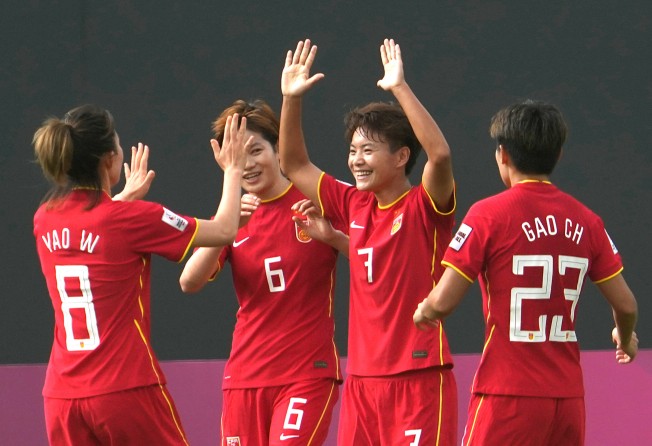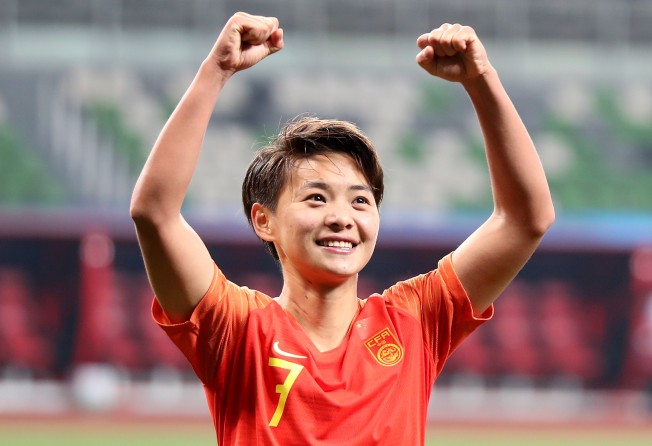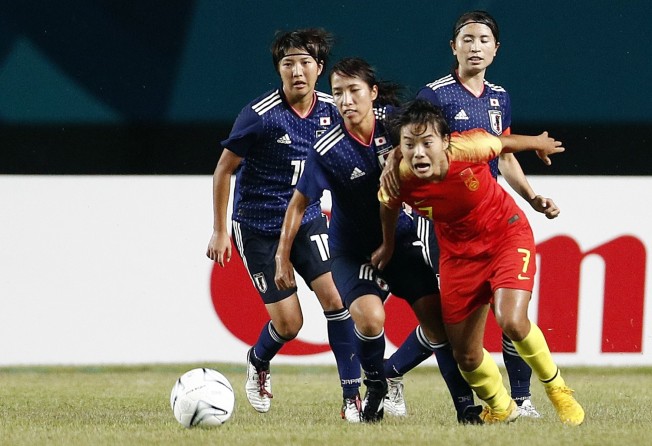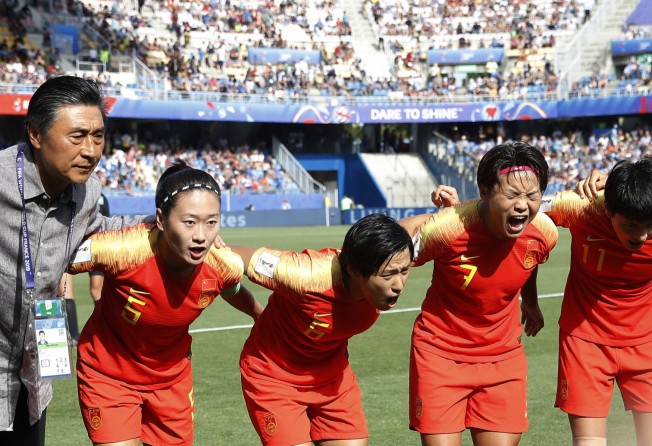
Wang Shuang: biography, family, Paris Saint-Germain struggles, Wuhan league title win, and China women’s saviour
- The 27-year-old midfielder is firing China into the 2023 Fifa World Cup – here’s what you need to know about the former PSG player
- From her parents’ traumatising divorce, to language barriers in France, to Covid-19 lockdowns in native Wuhan, Wang has been through the trenches

A once-in-a-generation talent for the China women’s national football team, Wang Shuang has become a household name after several game-defining performances against Asian counterparts.
At just 27, the left-footed midfield maestro was called upon to provide vital goals for their Olympic qualification last April – and she did so in stunning fashion, sparing blushes against a surging South Korea almost single-handed, before being engulfed by tearful teammates.
Upon China’s competitive return at the AFC Asian Cup in January after nine months, Wang scored four goals in two group matches to help seal a place in the knockout rounds. Reaching the semi-finals would guarantee a place at the 2023 Fifa Women’s World Cup in Australia and New Zealand.
“I don’t think I’ve reached the peak of my career yet,” she declared after scoring twice on her birthday in a 7-0 trouncing of Iran. “I’ve been doing well but I need to improve through more hard work. I think I will reach a better level in the years to come.”
From dealing with the traumas of her parents’ divorce, to her historic move to French giants Paris Saint-Germain, to training in isolation for her native Wuhan during the coronavirus pandemic, here’s what you need to know about the woman tasked with leading the line for the Steel Roses.

Biography
Wang Shuang was born on January 23, 1995 in Wuhan, Hubei Province, China and grew up using football as an escape from her unstable household. Her parents divorced when she was five and she was whisked away to live under her uncle and aunt’s roof.
The short-haired Manchester City jersey-wearing student was a stand-out among the boys in junior school, with her coach identifying that football was not only a distraction, but her destiny. “I thought football was my stage and people would be able to notice me,” Wang wrote in The Player’s Tribune.
By the age of 12, she earned a place in Renmin University’s high school affiliate in Beijing. She had to travel more than 100km from Wuhan to the capital alone, crying through the night while clutching onto her father’s empty promise that they would be on a train not long behind her.

The change in scene may have worsened familial ties but did wonders for Wang’s football ascent. She described several encounters with tough coaches at the national training school, but her steadfast mentality soon earned her a position in the national youth set-up.
Wang made her under-17 debut aged 12 and was in the squad at the 2012 U-20 World Cup at just 17. She went on to score five goals in nine games for the side before being promoted to the seniors, where she has scored 38 goals and counting.
After an impressive display at the EAFF Women’s East Asian Cup, an 18-year-old Wang earned a transfer from Wuhan Ladies to then-named Daejeon Sportstoto in the Korean women’s top division. She helped them reach the FA Cup final and earned the tournament’s MVP award.

Often recalled for national team duties, Wang ultimately returned to Wuhan ahead of the 2015 World Cup. Though China bowed out in the quarter-finals, she reasserted her ability to mix with the world’s best, scoring two goals in a 2-1 win over England and the winner against the US in a home invitational tournament a few months later.
Wang signed for the now-dissolved Dalian Quanjian of the Chinese Women’s Super League (CWSL) the following season, where she won two league titles.
Three years later – and a brief return to Wuhan Ladies once again in between – Paris Saint-Germain Fémenine came calling for a historic move. Such a high-profile signing came as a surprise but Wang was fresh off winning the AFC Asian Women’s Footballer of the Year – the first Chinese player in more than a decade to do so.
Wang left PSG by mutual consent in 2019 and returned to her homeland with Wuhan Jianghan University. She won her third CWSL championship in 2020 – ending the club’s 19-year wait – despite spending more than two months in government-imposed lockdown.
With Wuhan deemed the epicentre of the global pandemic, she was forced to train in isolation for 77 days. She dedicated the home league title win to all the city’s medical workers and donated 600,000 yuan (US$92,000) to the fight against the coronavirus.
In 2021, Wang led the Steel Roses through a nail-biting finale for 2020 Tokyo Olympics qualification. After scoring the winner against South Korea in Suzhou in the first leg, China found themselves forced into extra-time in the second. With momentum swinging both ways, Wang scored the goal that sealed qualification. The opposing coach called her “world class”, with Korean media detailing how “Wang Shuang beat us”.
Aside from being crowned Asia’s top player in 2018, Wang was named Chinese Women’s Footballer of the Year in 2017, 2018, 2019.
China national starlet
Wang has excelled in every national age group, often competing alongside and against players two to five years older. Though world football likely remembers her for her stint at PSG, her tendency to return to play China for reasons of national duties and homesickness should not be overlooked.
Her natural on-pitch flair and undisputed domestic accolades – helped last year by the narrative that China’s star player was placed under the world’s first Covid-19-induced lockdown – have earned hermore than 300,000 Weibo followers.
Her Tokyo 2020 qualifier heroics also reached Chinese social media’s top topics (11 of the top 50 Weibo search terms related to the win) and many fans in favour of reallocating funding from the men’s to women’s teams. Wang is responsible for many of the plaudits and has been given the nickname “Chinese football goddess” among many others. She matches – if not topples – men’s national team star Wu Lei of Spanish first division club Espanyol.
Lost in translation
Wang’s history making move to Europe’s top flight with PSG could not have started any sweeter. She scored a memorable long-range debut goal after coming on as a substitute with French daily Le Parisien saying “Wang Shuang has already conquered Paris”.
In her only season, she helped PSG to reach the Uefa Women’s Champions League quarter-finals, and became the first Chinese player to score in the tournament. She scored eight goals and 10 assists in 28 games.
However, Wang found it increasingly difficult to adapt to French life. Language was the biggest barrier, and she likened translator-less communication with players and coaches to being “like a riddle”.
“The difficulty of travelling to Europe is far from being as beautiful as it seems. What I care about is not money, and I am not afraid of hardship, but I can’t bear it. The feeling of disrespect and endless loneliness made me unable to find the best version of myself, so I decided to return to China to play in the national team,” she told Soccer News in April, quashing any rumours that she was forced to return by national team coach Jia Xiuquan.
Wuhan rooftop drills
Back in her linguistic and physical element, Wang thrived in the Covid-19-shortened Chinese domestic league. She used her days in lock down away from her teammates in January 2020 to double down on her technical abilities. She posted photos and videos of her makeshift training sessions in her living room and rooftop, many alongside her brother.
By year end, she was lifting the league title after a 4-0 win over reigning champions Jiangsu Suning. Wang thanked the medical workers who had helped the city back to its feet after months of strict precautionary containment.
“Our team have been cooped up for about four months and were unable to have training sessions due to the coronavirus lockdown. But when I finally stepped onto the pitch, my dream was to bring the league title back home to Wuhan, to all those health care workers and fans who remained unyielding in their support for this city,” she said.
Family
Family is a sensitive topic for Wang. The aforementioned brother she trained in lock down with is actually her cousin, and those she considers her “real parents” her aunt and uncle. “They are the people I love,” she said.
The issues surrounding Wang’s parents still traumatise her to this day. She was told to live with her uncle and aunt, but the transition took time. Wang recounted locking herself in her room for the first few weeks before even beginning to communicate with her new family, let alone get along with them.
Wang eventually opened up to her “older brother” and joined his elementary lunchtime boy’s football team. It was her first taste of the sport and she recalled being nicknamed “Tomboy” by teachers and parents for her short hair and willingness to get stuck in on the field. Her coach was harsh but it appeared to be a tactic to get the best out of the talented youth.
Wang’s path to football stardom started as a lonely one, particularly amid her move to the big city as a high school teen. The overnight train journey still triggers her and the big-game jitters occasionally come up on the pitch, as she recalled in a game in 2013. But the very same moment also highlighted the steady group of supporters she has amassed over the years – something she will never forget.
“For our first game at the Four Nations, against Canada, I was on the bench. With about 30 minutes left and the score 0–0, the coach told me to get changed. I was so nervous that I almost begged him not to. Noooo! Don’t call on me!,” she wrote. “My anxiety showed. I was running all over the pitch, not thinking, just trying to catch my breath. I hardly touched the ball. About 20 minutes later, the coach took me off.
“Coming off when you have been brought on in the same game does not happen often in football. It usually means that you have screwed up. We lost 1–0. After the game, I just went back to the hotel, took a shower and fell asleep. I was so embarrassed. The only positive was that I wouldn’t have to tell my family about it. Everyone had already seen it – the game had been live on national television.
“This time though, there was no criticism. People were actually supporting me. They were like, ‘Come on, it’s OK. It was your first game’. The coach said he would keep faith in me.”